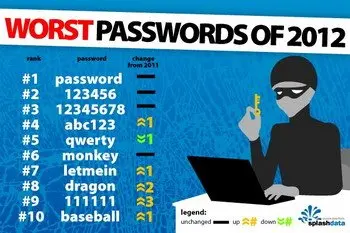This site uses only a few technical cookies necessary for its operation. By continuing to browse, you accept their use.
To find out more...
To find out more...
How to choose a good password
21 K 4.1/5 (35 reviews)
Last modified on: March 29th 2013
How to choose a good password

To create an account you need to choose a user identity. This is simple, as your email address is used in most cases (ann.other@gmail.com, for example). Then you will need a password.
Ah! The password: the access key to so many things in your life: your computer, tablet (maybe), inbox, profile on Facebook or other social media, all the websites – commercial or otherwise – where you have a user account (oh yes, cuisine-ez.com is one of them).
The problem with this password is that it needs to be difficult for a hacker to find when attacking one of your access points, but simple enough for you to remember easily.
You should be aware that one of the so-called "brute force" methods hackers use consists of using another computer to try thousands, even millions of words based on dictionaries (all the words in many different languages, all first names, all possible numbers, etc.). So obviously, you should forget any password which is a word or name, like “Jeremy” , or “11021990” . They will only take a couple of minutes to crack.
While we're on the subject, here are the top 10 worst passwords of 2012:

Let's look at what makes a good password:
- Meaningless when read, not a recognisable word or number
- Made up of lower and upper case letters along with numbers and, if possible, unusual characters (*, !, ?, etc.)
- At least 5 characters long, but 8 is better
- Known to you alone: a password is like a toothbrush – not for lending to others
So, how do we find this rare beast? Well, you can come up with a string of random characters, such as
1dH2$6up – very effective, but very hard to remember!
There is a much better solution: you will need to think of a phase, a fairly long one, that means something to you (the title of a film, book, poem, proverb, saying, etc.). Whatever it is, it needs to be familiar enough to come back to you quite naturally.
Let's use as an example the film "Star Wars Episode Five: The Empire Strikes Back". To create your password, use the first letter of each word, which will give you "sweftesb". This is difficult to guess and you can recite the title to yourself in your head as you type each letter.
That's really not bad at all, but we can improve it by adding in a few refinements: replace the "s" of "star" with "*" and replace the "f" of "five" with "5", which gives you "*we5tesb".
And Bob's your uncle! This system provides you with a password that is very difficult for a hacker to find, but which you can have at your fingertips in a matter of seconds.
Of course, you should never, ever, write it down anywhere afterwards, that negates the whole point…

If you need a reminder, just write down "empire strikes back" somewhere. That should be enough to jog your memory.
Lasts posts
XO Cognac Explained: Meaning, Aging, and Flavor Profile
XO Cognac always goes beyond the labels on the bottle: it is often associated with tradition and quality. You get to appreciate the artistry, character and ageing process when you understand what defines this smooth Cognac. The section below tackles everything about XO Cognac, from complex flavour...January 28th 20261,090 Sponsored article
Butter vs. grease
We often read in a recipe where a pastry is put into a mould that, just before pouring, the mould should be buttered or greased. But what's the difference between these 2 terms?December 1st 20252,6745
Getting out of the fridge early
Very often when you're cooking, you need to take food or preparations out of the fridge, to use them in the recipe in progress. There's nothing tricky about this: you just take them out of the fridge and use them, usually immediately, in the recipe. But is this really a good method?November 24th 20251,7105
Who's making the croissants?
When you look at a bakery from the outside, you naturally think that in the bakery, the bakers make the bread, and in the laboratory, the pastry chefs make the cakes. It's very often like that, with each of these professions having quite different ways of working, but sometimes there's also one...November 23th 20251,566
Oven height
When we put a dish or cake in the oven, we naturally tend to put it on the middle shelf, and that's what we usually do. But in some cases, this position and height can be a little tricky, so let's find out why.October 8th 20255,3135
Other pages you may also like
Too much sweet and savoury
There is a food trend which is creeping in everywhere in France right now: mixing sweet with savoury. In some restaurants, it is becoming difficult to order a classic dish, like “roast veal” for instance, without being served fruits in the garnish or honey/conserves/syrup in the sauce or cooked...November 3rd 201128 K4.5
The secret of cooking until "done"
This is a real chef's skill: being able to look at a fish fillet cooking and say, "Stop – that's enough, it's cooked". I always admire this ability to see at a glance if something is done. It is what sets the professionals apart from us mere amateurs. And it's true that how fish is cooked is...November 26th 201221 K4.4
Small, regular pieces
When we cook, bake or pastry, we often have to cut food into small pieces, often cubes, to incorporate them into a recipe or preparation. How do you get regular pieces fairly quickly?November 28th 202012 K4.5
Unmoulding cakes while hot
When you make a cake, pound cake or whatever (what bakers call a "travel cake" because it's easy to carry around) you've most likely made a batter, either by hand or in a food processor, which you then pour into a buttered pan. It's a classic, and I've already talked to you about 2 or 3 tips on...February 6th 202139 K4.6
Sorrel and its cooking
Do you like sorrel? This delicious plant with its beautiful bright green leaves, whose subtle acidity goes very well with many other things, including in particular cream, to form with salmon the emblematic dish of the 70's, "Salmon with sorrel" on which was built the beginning of the fame of the...March 19th 202212 K5
Post a comment or question
Follow this page
If you are interested in this page, you can "follow" it, by entering your email address here. You will then receive a notification immediately each time the page is modified or a new comment is added. Please note that you will need to confirm this following.
Note: We'll never share your e-mail address with anyone else.
Alternatively: you can subscribe to the mailing list of cooling-ez.com , you will receive a e-mail for each new recipe published on the site.









